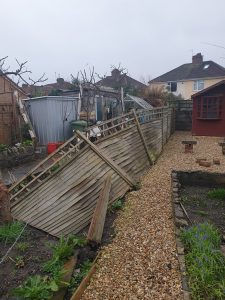 After many years of installing and repairing fences, we have come across hundreds of reasons why they might be damaged. We have noted that there does seem to be a few very common issue that will affect your garden fence.
After many years of installing and repairing fences, we have come across hundreds of reasons why they might be damaged. We have noted that there does seem to be a few very common issue that will affect your garden fence.
We have listed out the most common issues we see regularly.
Leaning Fences, Fence Posts, and Fallen Panels
Examine your fence and yard to see what’s causing it to lean or the panels to come away. These issues can be caused by high winds, poor soil conditions, impact damage, and compromised fence posts. If your fence is leaning due to heavy winds, you may be able to repair it by replacing the fence posts in their original places.
Installation Troubles
Not digging post holes deep enough, failing to account for sloped land in the design, and damaging utility lines during excavation are all common fence construction issues. The proper placement of post holes is critical for laying a stable foundation for your fence. This is especially important for do-it-yourself fence installers who do not have post hole drilling equipment. Three-foot-deep post holes should be dug out of concrete or gravel.
While specialised vinyl or chain-link fence panels can be ordered to fit sloped ground, most contractors will solve the problem on the job by constructing a stepped design, following the slope of the ground, or leaving the area unfenced.
Stained or Mildewed Fence
Wood Fence: A smaller wood fence may be washable by hand, but a larger wood fence will require the use of a power washer. Apply a stain to your fence once it’s clean to keep it durable and extend its life. Find out how to clean a wood fence.
Vinyl Fences: Clean your vinyl fence with water and mild soap. Use a stronger cleaning solution or a pressure washer to remove harder stains off your fence. Keep in mind that vinyl fences lose their lustre over time.
Rot and Insect Damage
The vulnerability of wood fencing to decay and insect infestation is one of its significant drawbacks. If you’re looking for a new fence, keep in mind that some materials (such as cedar and pressure-treated wood) are more resistant than others. If you suspect your fence is infested with termites, don’t wait to take action, especially if the fence is adjacent to your home. Termites aren’t welcome in your fence, but they’re certainly not welcome in your home.
Decide whether repair or replacement makes more financial sense after you’ve determined the degree of the damage. Smaller pieces of the fence may be salvaged, but bigger sections may necessitate a complete fence replacement. Keep your fence in good shape by sealing it.
Wooden fences are prone to rotting from moisture damage. If you notice any cracks on your wooden fence, it may be time to repaint or refinish your fence. A good way to prevent rot is to paint your fence every two years. This helps keep water away from the wood so it doesn’t get wet and decay.
If you have a wooden fence that needs more work than painting, consider installing new boards as needed.
If you have any fencing problems in and around Bristol give Grant a call today.
